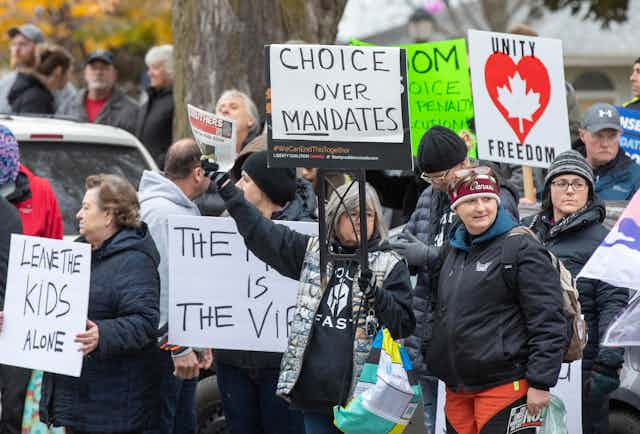Federal Health Minister Jean-Yves Duclos wants provinces to make vaccination mandatory. Québec has proposed a health tax for the unvaccinated. And other democracies have proposed similar laws. But fining or taxing the unvaccinated raises practical and legal problems. Here, I focus on the legal issues.
As the pandemic wears on, governments are bringing in more and more vaccine mandates. First you needed a vaccine to go to bars, restaurants and gyms. Then there were workplace mandates, then mandates to travel on trains and airplanes. Québec has recently required vaccines to enter liquor and cannabis stores.
With vaccination rates barely budging in recent weeks, governments are looking for new ways to get needles in arms.
Penalties for the unvaccinated
The latest proposal is to require vaccination, full stop. But it’s important to note that this doesn’t mean forcing people to be vaccinated. Rather, the most likely scenario is a provincial law making it an offence not to be vaccinated. The penalty would most likely be a fine, though jail time is not out of the question.

Consider what some European countries have done. Austria was the first in Europe to require vaccination with fines for non-compliance of up to 3,600 euros ($5,150). In Greece, a monthy fine of 100 euros will be imposed on those over 60 who are unvaccinated, starting Jan. 16. In Italy, those over 50 will face fines if they’re not vaccinated. While the penalty is still being determined, it appears it will be at least 100 euros.
Can Canada mandate vaccines?
Whether a government can mandate vaccines depends on what exactly a new law says. Canadians have rights to make decisions about vaccination but these rights are not absolute. And having rights does not mean there will be no consequences for your decisions.
If a province tried to impose a fine or other penalty on the unvaccinated, a challenge under the Canadian Charter of Rights and Freedoms would surely follow. The argument would be that this violates people’s right to life, liberty and security of the person, and perhaps other rights like freedom of conscience.
Whether the law is constitutional would come down to issues like whether it’s as narrow as possible, whether it would significantly increase vaccination rates and whether the government had done enough to promote voluntary vaccination.
For example, laws with exceptions for those with medical reasons not to be vaccinated would be more likely to be constitutional. Those limited to people over a certain age (as in Italy and Greece) would be easier to justify. And first making all other reasonable efforts to promote voluntary vaccination would help make the law constitutional.

As for significantly increasing vaccination rates, it is debatable whether a vaccine mandate would do that. Many people may prefer to pay a fine than to be vaccinated. If the fine were high enough to change people’s minds, it may also be unduly harsh — especially for marginalized populations.
Governments should avoid a scenario in which the rich pay to avoid vaccination, while the poor have fewer options. One possibility is to have the amount of the fine or tax depend on one’s income.
Also at play in the effectiveness of a vaccine mandate is timing. A mandate likely wouldn’t take effect until after the peak of the fifth wave. The benefit of current vaccines for future waves or variants is unknown.
That will make it harder for governments to argue that such a law doesn’t erode rights any more than necessary — an important part of the constitutional analysis. That said, vaccines will surely continue to be a vitally important tool in fighting COVID-19.
Encouraging vaccination vs. recovering costs
A final issue, raised by Québec’s approach, is whether the law is meant to increase vaccination rates or recover health-care costs. Both fines and taxes add to a province’s bottom line but a law’s purpose matters in constitutional law.
A mandate is more likely to incentivize vaccinations while a health tax is primarily meant to recover health-care costs. (Singapore went further by charging the unvaccinated for their own hospital costs should they become hospitalized.)
Mandates more directly implicate one’s right to bodily autonomy. A tax could be said only to affect one’s finances. This may make a tax more constitutionally sound.
That said, it raises serious policy issues. Universal health care does not cost more for citizens simply because they are more likely to need health care. That’s part of what makes it universal. It’s not like private insurance that ties premiums to risk. Tobacco and alcohol may be heavily taxed, but we don’t tax dangerous sporting activities, unhealthy eating, having a stressful job or lack of exercise.
Charging more for universal health care based on personal choices is controversial and raises important moral and practical issues. Governments should think carefully about the implications before eroding the principle of universality.

